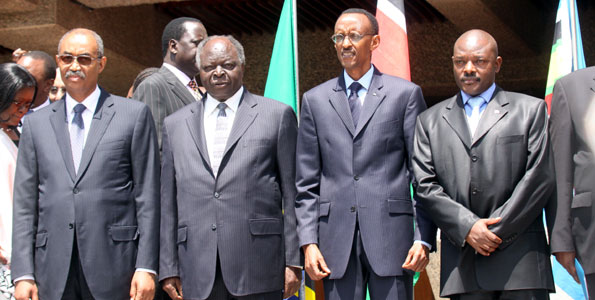EAC installs free market project with a new treaty

Business Daily | Friday, November 20 2009 at 00:00
EAC installs free market project with a new treaty
By George Omondi
East Africa’s integration project will enter a new phase this morning with the signing of an agreement at its Arusha headquarters that should usher in a seamless 80 million-people-market early next year.
The journey to unfettered trade will begin with the signing of the protocol for the establishment of the common market — an economic term referring to a union of countries that have agreed to remove all cross-border tariffs and allow free movement of goods and services across their borders.
Also critical to the functioning of a common market is the free movement of people and use of common external tariffs to protect local producers.
Too tiny to thrive
The launch of the common market comes just 10 years after Uganda, Kenya and Tanzania revived the regional integration project that collapsed in 1977 at the height of political and ideological differences among the governments.
The integration project is being seen as part of Africa’s response to concern that some of the national economies are too tiny to thrive in an increasingly competitive world dominated by large economies such as China, India, US and the European Union.
The project takes off against the backdrop of EU concern that the crash integration module, which anticipates a monetary union within 12 years— compared to Europe’s 42 years —could deny the negotiators the time they need to agree on sensitive matters that are bound to erode each country’s territorial integrity.
“A joint forum between EAC and EU leaders could perhaps awaken East Africa to the need for broader and elaborate consultation before signing the common market protocol,” said Tim Clarke, a EU representative in Tanzania.
The pace at which the EAC has concluded discussions on critical stages of integration process has raised eye-brows even in Africa where similar projects have barely moved beyond free trade area agreements.
Presidents Jakaya Mrisho Kikwete (Tanzania), Yoweri Kaguta Museveni (Uganda), Mwai Kibaki (Kenya), Paul Kagame (Rwanda) and Mr Pierre Nkurunziza of Burundi have however brushed off the concerns, arguing that there is more to gain than any possible losses.
When the leaders convene at the Sheikh Amri Abeid Stadium in Arusha this morning, attention will be on Mr Kikwete and Mr Amani Abeid Karume, the President of Tanzania’s semi-autonomous island of Zanzibar, who by signing the agreement will be taking the experiment of integration to a new level.
Official data from the EAC secretariat shows that Uganda remains the leading destination for Kenyan goods followed by Tanzania and Rwanda respectively.
Trade experts however say that Tanzania, which has the largest population in the region, has the vast business potential that is yet to be exploited.
In a region whose economy is mainly driven by agricultural activities, Tanzania’s large tracts of furrow land has attracted the attention of budding entrepreneurs from across the region amid vigorous resistance by the locals.
“Close to 90 per cent of arable land in Tanzania is lying idle and we hope opening the borders through a common market will open them up for farmers who could solve the food insecurity problem of the region,” EAC secretary general Juma Mwapachu said in an earlier interview.
Tanzania is also endowed with vast mining and manufacturing potential that investors, especially from Kenya, have been craving.
The few Tanzanians who are in the manufacturing and mining sectors are said to espouse monopolistic mentality to doing business, having established themselves during the Ujamaa days.
Retain supremacy
The state used Ujamaa policy to confine majority of the population to villages where the main activity was farming, in the process creating a huge market for the few who ventured in mining and manufacturing at the time.
A few months ago, Tanzania succeeded in negotiating to retain supremacy of its national laws in matters of immigration, access to land and right of business establishment within its territory in the draft EAC common market protocol.
Kenyan negotiators argue that allowing Tanzania to evoke its national laws on matters of land and business establishment could turn out to be a huge non-tariff barrier in the region.
However, experts reckon such a move is the only way a country just emerging from controlled economic system can cushion its local investors ill prepared for cut throat competition posed by firms from other states that adopted capitalism right from independence.
Tanzanians do not have national registration system and citizens must obtain letters from community elders for purposes of employment and other transactions.
This technically locks out thousands of individuals who had hoped national identity cards indicating that they are citizens of an EAC state would guarantee them employment opportunities in Tanzania
Tanzania’s land is either community or state owned.
An individual does not have the right to sell community land to an outsider without seeking the state’s permission (in which case the sold land immediately reverts to the state).





